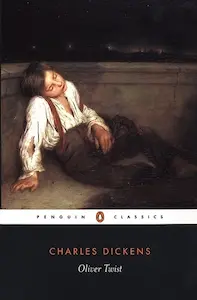Oliver Twist - Summary
Charles Dickens

Introduction
“Oliver Twist” by Charles Dickens is a timeless classic that explores the harsh realities of life in 19th-century London. This gripping novel takes readers on a journey through the life of the eponymous protagonist, Oliver Twist, as he navigates the treacherous streets and encounters a cast of memorable characters. Dickens masterfully weaves together themes of poverty, social injustice, and the power of compassion, making “Oliver Twist” a thought-provoking and influential piece of literature.
The Orphan’s Plight
Oliver Twist, an orphan born in a workhouse, serves as a symbol of innocence and vulnerability in a society plagued by poverty and corruption. Dickens vividly portrays the grim conditions faced by orphans like Oliver, who endure neglect, abuse, and exploitation. From the very beginning, the reader is drawn into Oliver’s world of deprivation and despair. The author’s use of vivid imagery and descriptive language paints a vivid picture of the squalor and hopelessness that permeate Oliver’s existence.
The Cruelty of Fagin and the Artful Dodger
One of the most memorable characters in “Oliver Twist” is Fagin, the cunning and manipulative leader of a gang of child thieves. Fagin preys on vulnerable children, including the charismatic Artful Dodger, who becomes Oliver’s guide to the criminal underworld. Through Fagin and the Artful Dodger, Dickens exposes the corrupting influence of poverty and the exploitation of innocent individuals. The author’s portrayal of Fagin’s manipulation and the Dodger’s street-smart charm serves as a stark reminder of the dangers faced by those living on the fringes of society.
The Redemption of Nancy
In contrast to the malevolent characters that populate the novel, Nancy, a prostitute with a kind heart, emerges as a beacon of hope and compassion. Despite her own difficult circumstances, Nancy shows empathy towards Oliver and risks her own safety to protect him from the clutches of Fagin and his gang. Dickens skillfully portrays the internal struggle faced by Nancy, torn between her loyalty to Bill Sikes, a brutal criminal, and her desire to do what is right. Nancy’s ultimate act of self-sacrifice highlights the redemptive power of love and the capacity for goodness even in the darkest of places.
The Theme of Social Injustice
“Oliver Twist” serves as a scathing critique of the social inequalities prevalent in Victorian England. Dickens exposes the stark divide between the wealthy and the impoverished, shedding light on the deplorable living conditions and exploitation faced by the lower classes. Through his vivid descriptions and powerful storytelling, Dickens compels readers to confront the harsh realities of a society that perpetuates poverty and denies basic human rights to its most vulnerable members. The novel’s exploration of social injustice continues to resonate with readers today, reminding us of the importance of addressing systemic inequalities.
The Power of Compassion
Amidst the darkness and despair, “Oliver Twist” also offers a glimmer of hope through its exploration of the power of compassion. Oliver’s unwavering innocence and purity of heart serve as a catalyst for change, inspiring acts of kindness and selflessness in those he encounters. From the compassionate Mrs. Maylie to the benevolent Mr. Brownlow, Oliver’s journey is marked by the transformative impact of compassion and empathy. Dickens reminds us that even in the face of adversity, small acts of kindness can have a profound ripple effect, ultimately leading to positive change.
The Symbolism of Oliver’s Journey
Throughout the novel, Oliver’s journey serves as a metaphor for the quest for identity and belonging. As he navigates the treacherous streets of London, Oliver strives to find his place in a society that rejects him. His search for love and acceptance resonates with readers, highlighting the universal human desire for connection and understanding. Through Oliver’s trials and tribulations, Dickens explores themes of identity, resilience, and the power of hope, reminding us of the importance of staying true to oneself in the face of adversity.
The Role of Satire
In “Oliver Twist,” Dickens employs satire to expose the hypocrisy and moral decay of Victorian society. Through his sharp wit and biting social commentary, the author critiques institutions such as the workhouse, the justice system, and the church, which perpetuate injustice and fail to protect the most vulnerable. Dickens’ use of satire serves as a powerful tool to provoke thought and incite change, challenging readers to question societal norms and advocate for a more just and compassionate world.
The Enduring Legacy of “Oliver Twist”
“Oliver Twist” continues to captivate readers and leave a lasting impact on literature and popular culture. Its themes of poverty, social injustice, and the triumph of the human spirit remain relevant in today’s society. The novel’s memorable characters and Dickens’ masterful storytelling continue to inspire adaptations in various forms, from stage plays to film adaptations. “Oliver Twist” serves as a timeless reminder of the power of literature to shed light on societal issues and ignite conversations that can lead to positive change.
Conclusion
In conclusion, “Oliver Twist” by Charles Dickens is a literary masterpiece that delves into the dark underbelly of Victorian society. Through the eyes of the innocent Oliver Twist, Dickens exposes the harsh realities faced by the impoverished and marginalized. The novel’s exploration of poverty, social injustice, and the transformative power of compassion continues to resonate with readers, prompting us to reflect on our own society and strive for a more equitable and compassionate world. “Oliver Twist” stands as a testament to the enduring power of literature to inspire empathy, provoke thought, and ignite social change.